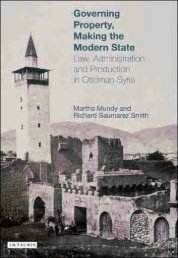The Young Turk Period, 1908-1918 - PSI424
The Young Turk Period, 1908-1918 - PSI424
The Young Turk Period, 1908-1918 - PSI424
You also want an ePaper? Increase the reach of your titles
YUMPU automatically turns print PDFs into web optimized ePapers that Google loves.
288 <strong>The</strong> Rise of Modern <strong>Turk</strong>ey, 1808-1975<br />
But Ottomanism, as it was developed in the <strong>Young</strong> <strong>Turk</strong> period, meant essentially<br />
cooperation in a united empire, not the kind of autonomy that the Albanian nationalists<br />
wanted. <strong>The</strong> <strong>Young</strong> <strong>Turk</strong>s did not hamper the activities of the Albanian nationalist<br />
clubs at first, but they also established in Albania, as elsewhere in the<br />
empire, their own party headquarters, which in advocating Ottomanism campaigned<br />
against the nationalists. In reaction, the latter renewed demands for autonomy,<br />
development of the Albanian language, and appointment of Albanians to<br />
key positions in the province. Ismail Kemal Vlora came to Istanbul as parliamentary<br />
deputy for Berat and acted as their principal voice in the capital. <strong>The</strong><br />
participation of Albanian soldiers in the 1909 counterrevolution and Ismail Kemal's<br />
cooperation with the Liberal Union contributed to the misunderstanding. <strong>The</strong><br />
<strong>Young</strong> <strong>Turk</strong>s assumed that all the Albanian Muslims supported the central government<br />
against the Christians, but the issues were complex. Many Muslims supported<br />
the nationalists, putting their Albanian identity above all else, while many<br />
Christians, especially the Gheg tribes of the north, opposed them because they<br />
feared losing their traditional privileges in an autonomous Albania.<br />
<strong>The</strong> Albanian revolt, when it finally came in the winter and spring of 1910, was<br />
as much a campaign against the new efforts at efficiency and centralization as it<br />
was a national movement. <strong>The</strong> new census and tax regulations struck especially<br />
at mountaineers who had long treasured their independence and avoided conscription.<br />
<strong>The</strong> laws against vagabonds and national societies struck Albania in<br />
particular because of its traditional armed bands, which had dominated the mountains<br />
for centuries. <strong>The</strong>se laws transformed general resentment against government<br />
controls into open support of the nationalists. <strong>The</strong> harshness of Mahmut<br />
§evket's suppression of the initial revolts won new supporters for the nationalists.<br />
Montenegro began to support the rebels, not only shielding and arming Albanian<br />
refugees but also pleading their case in Europe, demanding that the sultan give a<br />
general amnesty, compensate for all confiscated weapons and property, and that<br />
all municipal and district chiefs in the province be Albanians. During the winter<br />
of 1911, the trouble mounted, and the nationalists demanded the limitation of<br />
Albanian tax revenues to expenditures in Albania. <strong>The</strong> revolt was begun by the<br />
Catholic Albanians, but thousands of Muslims soon joined in the demand for "liberty,<br />
justice, and autonomy." In June 1911 the sultan himself visited Kosova to<br />
calm the situation, signing a decree of amnesty and introducing many concessions,<br />
including Albanian schools, military service to be performed only in the province,<br />
suspension of all conscription and taxes for two years, and the use of officials conversant<br />
in Albanian. But while these measures calmed the north, the revolt in the<br />
south intensified, with a national Albanian committee formed at Vlora demanding<br />
union of the provinces of Isjcodra, Kosova, Monastir, and Janina into a single Albanian<br />
province governed by its own Parliament and administration and with its<br />
own army (May IS, 1911). <strong>The</strong> government finally gave in to most of the demands<br />
(August 1911), but the solution again proved temporary. By this time Ismail<br />
Kemal and his associates were convinced that they could secure far more than<br />
autonomy as a result of the Ottoman-Italian war in Tripoli and the promises of<br />
assistance from the latter as well as from Montenegro. By June 1912 Albania was<br />
again in open revolt, with the rebels now demanding a united Albania, fully autonomous,<br />
administered by and for Albanians.












